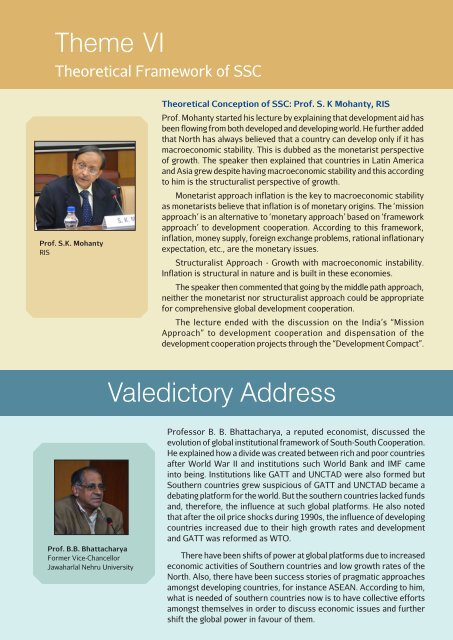SOUTH-SOUTH COOPERATION
LSSC_Brochure-2015_Webnew
LSSC_Brochure-2015_Webnew
Create successful ePaper yourself
Turn your PDF publications into a flip-book with our unique Google optimized e-Paper software.
Theme VI<br />
Theoretical Framework of SSC<br />
Prof. S.K. Mohanty<br />
RIS<br />
Theoretical Conception of SSC: Prof. S. K Mohanty, RIS<br />
Prof. Mohanty started his lecture by explaining that development aid has<br />
been flowing from both developed and developing world. He further added<br />
that North has always believed that a country can develop only if it has<br />
macroeconomic stability. This is dubbed as the monetarist perspective<br />
of growth. The speaker then explained that countries in Latin America<br />
and Asia grew despite having macroeconomic stability and this according<br />
to him is the structuralist perspective of growth.<br />
Monetarist approach inflation is the key to macroeconomic stability<br />
as monetarists believe that inflation is of monetary origins. The ‘mission<br />
approach’ is an alternative to ‘monetary approach’ based on ‘framework<br />
approach’ to development cooperation. According to this framework,<br />
inflation, money supply, foreign exchange problems, rational inflationary<br />
expectation, etc., are the monetary issues.<br />
Structuralist Approach - Growth with macroeconomic instability.<br />
Inflation is structural in nature and is built in these economies.<br />
The speaker then commented that going by the middle path approach,<br />
neither the monetarist nor structuralist approach could be appropriate<br />
for comprehensive global development cooperation.<br />
The lecture ended with the discussion on the India’s “Mission<br />
Approach” to development cooperation and dispensation of the<br />
development cooperation projects through the “Development Compact”.<br />
Valedictory Address<br />
Prof. B.B. Bhattacharya<br />
Former Vice-Chancellor<br />
Jawaharlal Nehru University<br />
Professor B. B. Bhattacharya, a reputed economist, discussed the<br />
evolution of global institutional framework of South-South Cooperation.<br />
He explained how a divide was created between rich and poor countries<br />
after World War II and institutions such World Bank and IMF came<br />
into being. Institutions like GATT and UNCTAD were also formed but<br />
Southern countries grew suspicious of GATT and UNCTAD became a<br />
debating platform for the world. But the southern countries lacked funds<br />
and, therefore, the influence at such global platforms. He also noted<br />
that after the oil price shocks during 1990s, the influence of developing<br />
countries increased due to their high growth rates and development<br />
and GATT was reformed as WTO.<br />
There have been shifts of power at global platforms due to increased<br />
economic activities of Southern countries and low growth rates of the<br />
North. Also, there have been success stories of pragmatic approaches<br />
amongst developing countries, for instance ASEAN. According to him,<br />
what is needed of southern countries now is to have collective efforts<br />
amongst themselves in order to discuss economic issues and further<br />
shift the global power in favour of them.


